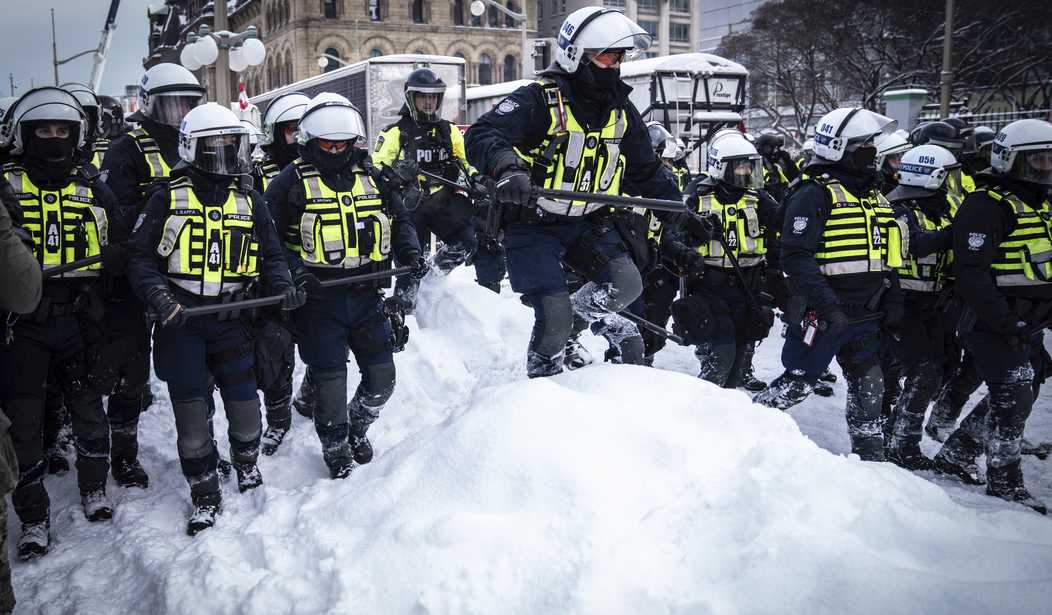Over the past few weeks, we’ve looked at the tyrannical and authoritarian actions that Canada’s government, led by Prime Minister Justin Trudeau, has taken against the Freedom Convoy.
Part of that authoritarianism is Trudeau’s invocation of the Emergencies Act, a bill that gives the prime minister and the cabinet sweeping authority — in this case, to use police and financial power to quell the protests.
Canada’s government has never used the Emergencies Act before. It’s a newer version of the War Measures Act, which Trudeau’s father Pierre invoked in 1970 in response to kidnappings at the hands of Quebec separatists. As I pointed out not long ago, authoritarianism runs in the Trudeau family.
Parliament has to approve the use of the Emergencies Act for more than a short span of time. On Monday, the House of Commons narrowly voted to give the government power under the Emergencies Act for 30 days. Trudeau awaits Senate approval to become a temporary dictator of Canada.
Substack publisher and former Canadian Broadcasting Corporation journalist Tara Henley interviewed Canadian constitutional scholar Ryan Alford about the Emergencies Act and whether Trudeau’s use of it is lawful under Canada’s constitution.
In addition to his constitutional studies, Alford was one of 34 lawyers who signed an open letter advocating against the use of the Emergencies Act.
Alford gave a quick explanation of what Parliamentary approval of the Act would mean:
Parliament, as required by the Emergencies Act, met within seven days of the invocation of the act by the government, to confirm that the act should remain in force for a period of up to 30 days. What that means is that one chamber of Parliament has approved the continuing operation on the Emergencies Act; the Senate will need to debate this and vote on this as well. With that approval, the cabinet can continue to issue regulations that have the force of law, without any oversight from Parliament, for 30 days beginning with the proclamation of the Emergencies Act last week.
Alford stated that Trudeau has no basis to invoke the Emergencies Act legally.
“In essence, what the government has done is falsely asserted that conditions exist that allow it to declare a state of emergency,” he noted. “And in making that false declaration, it has assumed powers to itself that it doesn’t have under the Constitution of Canada. And it has used that power to promulgate regulations that, because there’s no jurisdictional basis, are of no force in effect.”
Recommended: Democrat Congressman Suggests the Redistribution of Trucks
When Henley asked what Trudeau’s rationale for declaring an emergency is now that the protests have died down, Alford replied that it’s “purely speculative.” The government wants to ensure that the protests don’t fire back up or resurge. Trudeau and his administration want to remove the protesters’ ability to conduct financial transactions, and Alford said that everyday Canadians are worried about their finances as a result.
“Right now, people are asking me: Can I contribute to legal defence funds? Can I contribute to bail funds? Can I contribute to the constitutional challenges being brought by the Canadian Civil Liberties Association without fear of having my accounts frozen?” he noted. “Now, that is probably outside of the scope of what’s contemplated by the government. But the fact that people are asking me that indicates how far we’ve gone, and how problematic this is. This is really shocking.”
Alford also rightly stated that if actions like this were taking place at the hands of Russia or China, Canadians would be condemning it.
When Henley asked Alford about the damage that he asserts Trudeau’s actions will do to Canada’s constitution, Alford brought up Pierre Trudeau’s use of the War Measures Act during the October Crisis of 1970 (see this article for details). The overreach on the part of Trudeau père led the government to update the Emergencies Act to prevent a future power-hungry administration from going too far. In other words, to prevent what’s happening at this exact moment.
Alford addressed the idea that the government may consider asking to extend the use of the Emergencies Act beyond 30 days. He pointed out that the need to extend it proves that the Freedom Convoy isn’t an emergency and that the only real power the government is claiming that it doesn’t already have is the power to financially punish protesters and their supporters.
Henley and Alford concluded the interview by looking at conditions in Ottawa, where Alford lives. He noted that Ottawa isn’t a monolithic city and that many of the people in the city sympathize with the Freedom Convoy. He also pointed out how sad it is to him that so many left-leaning Ottawans considered the protests an “occupation” but not the authoritarianism that has arrived in their wake.
“For people now to say, ‘We’re so happy that the occupation is over,’ when hundreds of barriers have been created, with fencing, throughout Centretown, and you need to show your papers to police officers and indicate that you have an exceptional reason to be in there, or be arrested, that’s shocking to me, that people don’t see that as an occupation,” he lamented.










Join the conversation as a VIP Member